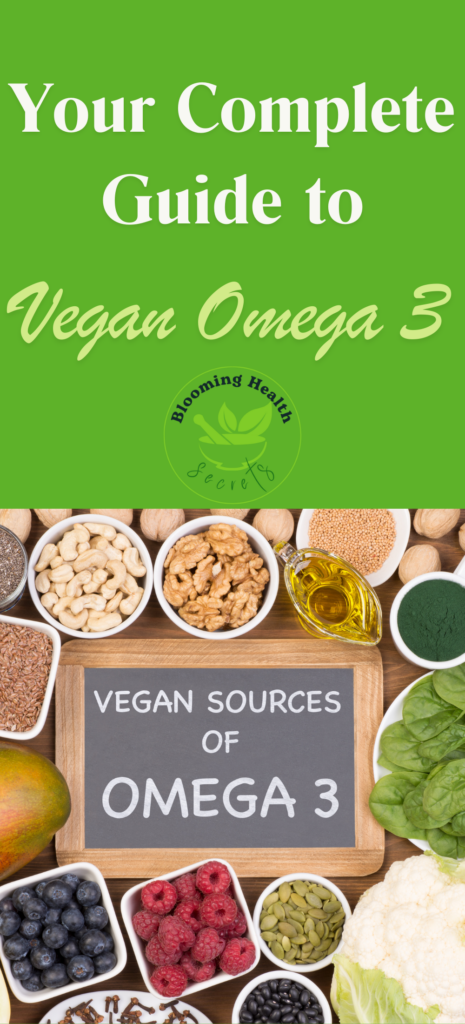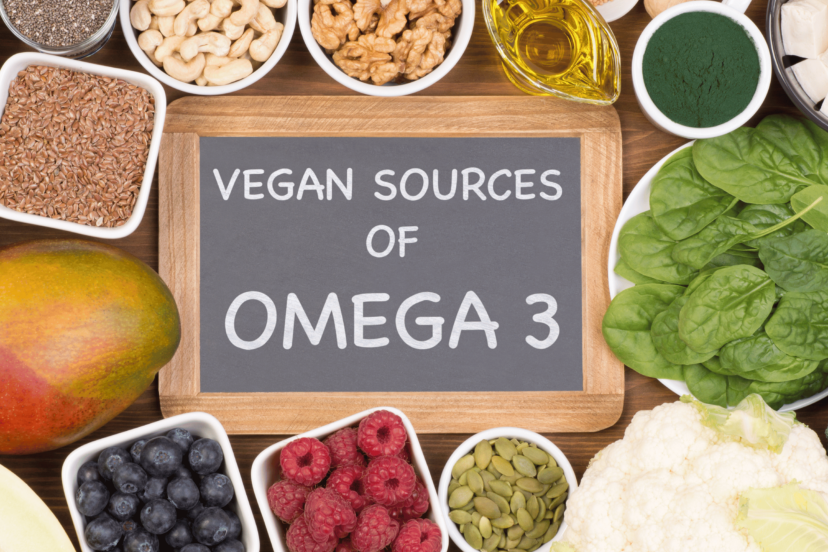Vegan Omega 3: How To Meet Your Daily Requirements
Are you looking to boost your omega-3 intake while following a vegan lifestyle? You’re not alone! Many individuals transitioning to or already living a vegan lifestyle seek alternatives to fish oil supplements for their omega-3 needs.
Luckily, there are plenty of plant-based sources of omega-3 fatty acids that can support your health and well-being.
In this comprehensive guide, we’ll explore everything you need to know about vegan omega-3, from its importance to sources and supplementation, empowering you to make informed choices for your dietary needs.
Understanding Omega-3 Fatty Acids
Let’s start with the basics: what exactly are omega-3 fatty acids?
Omega-3s are essential polyunsaturated fats that play a crucial role in maintaining overall health, particularly heart health, brain function, and inflammation regulation.
There are three main types of omega-3 fatty acids: alpha-linolenic acid (ALA), eicosapentaenoic acid (EPA), and docosahexaenoic acid (DHA).
Importance of Omega-3s in a Vegan Diet
Omega-3 fatty acids are essential nutrients that the body cannot produce on its own, meaning they must be obtained through dietary sources.
While fish and seafood are commonly associated with omega-3s, it’s entirely possible to meet your omega-3 needs on a vegan diet with the right food choices and supplementation.
Omega-3s are crucial for supporting heart health, brain function, eye health, and reducing inflammation, making them an integral part of a balanced vegan diet.
Plant-Based Sources of Omega-3s
Contrary to popular belief, you don’t need to consume fish or fish oil supplements to get an adequate amount of omega-3s in your diet.
Many plant-based foods are rich in ALA, the precursor to EPA and DHA, which can be converted in the body to these forms of omega-3s, although conversion rates vary.
Some of the best vegan sources of ALA include:
- • Flaxseeds
- • Chia seeds
- • Hemp seeds
- • Walnuts
- • Flaxseed oil
- • Chia seed oil
Maximizing ALA Conversion to EPA and DHA
While ALA is abundant in many plant foods, the conversion of ALA to EPA and DHA in the body is relatively inefficient.
To optimize conversion, it’s essential to consume a variety of ALA-rich foods regularly.
Additionally, including foods fortified with EPA and DHA or incorporating algae-based omega-3 supplements into your routine can ensure you’re getting an adequate intake of these essential fatty acids.
Exploring Algae-Based Omega-3 Supplements
If you’re looking for a direct and reliable source of EPA and DHA on a vegan diet, algae-based omega-3 supplements are an excellent option.
Algae is the primary source of omega-3s for fish, and supplements derived from algae provide a sustainable and vegan-friendly alternative to fish oil.
These supplements offer a concentrated source of EPA and DHA without the risk of environmental contaminants often found in fish oil.
Incorporating Omega-3-Rich Foods Into Your Diet
Adding omega-3-rich foods to your meals and snacks is easy and delicious!
Try sprinkling ground flaxseeds or chia seeds onto oatmeal or yogurt, blending hemp seeds into smoothies, tossing walnuts into salads or stir-fries, or drizzling flaxseed oil over roasted vegetables.
By incorporating these foods into your daily diet, you can effortlessly boost your omega-3 intake and support your overall health.

Cooking with Vegan Omega-3-Rich Ingredients
Get creative in the kitchen and experiment with different ways to incorporate omega-3-rich ingredients into your favorite recipes.
Use flaxseed meal as an egg substitute in baking, blend chia seeds into homemade energy bars or puddings, add hemp seeds to homemade granola or trail mix, or use walnut oil in salad dressings or marinades.
With a little imagination, the possibilities are endless!
Omega-3s for Heart Health
Omega-3 fatty acids play a crucial role in supporting heart health by reducing inflammation, lowering triglyceride levels, and improving overall cardiovascular function.
Research suggests that consuming omega-3-rich foods or supplements may help lower the risk of heart disease and stroke, making them an essential component of a heart-healthy vegan diet.
Omega-3s for Brain Function
In addition to their benefits for heart health, omega-3 fatty acids are also vital for brain function and cognitive health.
DHA, in particular, is abundant in the brain and plays a critical role in brain development and function throughout life.
Consuming adequate amounts of DHA may help support memory, concentration, and overall cognitive function, making it essential for individuals of all ages.
Omega-3s for Eye Health
Omega-3 fatty acids are also important for maintaining eye health and may help reduce the risk of age-related macular degeneration and other eye conditions.
DHA, in particular, is concentrated in the retina and plays a crucial role in visual development and function.
Including omega-3-rich foods or supplements in your diet can help support healthy vision and protect against eye-related issues.
Summary: Harnessing the Power of Vegan Omega-3
In conclusion, vegan omega-3 fatty acids are essential nutrients that play a vital role in supporting overall health and well-being.
While fish and fish oil supplements are commonly associated with omega-3s, it’s entirely possible to meet your omega-3 needs on a vegan diet through plant-based sources and supplementation.
By incorporating ALA-rich foods like flaxseeds, chia seeds, hemp seeds, and walnuts into your diet, along with algae-based omega-3 supplements, you can ensure you’re getting an adequate intake of these essential fatty acids to support heart health, brain function, eye health, and overall vitality.
FAQs about Vegan Omega-3:
- Can vegans get enough omega-3s from plant-based sources alone?
Yes, it’s possible to obtain adequate omega-3 fatty acids from plant-based sources like flaxseeds, chia seeds, hemp seeds, walnuts, and algae-based supplements.
- Are there any risks of consuming too much omega-3 fatty acids?
While omega-3 fatty acids are essential for health, excessive intake of certain types, particularly EPA and DHA from supplements, may have adverse effects and should be monitored.
- What are the benefits of algae-based omega-3 supplements compared to fish oil supplements?
Algae-based omega-3 supplements offer a sustainable and vegan-friendly alternative to fish oil, providing a direct source of EPA and DHA without the risk of environmental contaminants.
- How can I ensure optimal conversion of ALA to EPA and DHA in the body?
Consuming a variety of ALA-rich foods regularly, along with including foods fortified with EPA and DHA or incorporating algae-based omega-3 supplements, can help optimize conversion.
- Are there any potential side effects of algae-based omega-3 supplements?
Algae-based omega-3 supplements are generally well-tolerated, but some individuals may experience mild gastrointestinal symptoms such as bloating or diarrhea. It’s always best to consult with a healthcare professional before starting any new supplement regimen.
References:
- “Omega-3 Fatty Acids: An Essential Contribution” by Simopoulos (2002):
This seminal paper discusses the importance of omega-3 fatty acids in human health, emphasizing their role in reducing inflammation, supporting cardiovascular health, and promoting brain function. The author highlights the benefits of incorporating omega-3-rich foods into the diet, including plant-based sources such as flaxseeds, chia seeds, and walnuts. - “Vegetarian Omega-3 Fatty Acids: A Review” by Geppert et al. (2005):
This comprehensive review examines the omega-3 fatty acid status of vegetarians and vegans and explores the efficacy of plant-based sources in meeting omega-3 requirements. The review discusses the conversion of ALA to EPA and DHA, as well as the potential health benefits associated with vegetarian omega-3 intake, such as reduced risk of cardiovascular disease. - “Algal Oil: A Plant-Based Source of Omega-3 Fatty Acids” by Rizzo et al. (2014):
This study investigates the efficacy of algal oil supplements as a vegan-friendly source of EPA and DHA. The researchers conducted a randomized controlled trial comparing the effects of algal oil supplementation to fish oil supplementation on omega-3 levels in vegetarians and found that algal oil effectively raised EPA and DHA levels, supporting its use as a plant-based alternative to fish oil. - “Omega-3 Fatty Acids and Vegetarian Diets: A Systematic Review” by Lane et al. (2014):
In this systematic review, the authors examine the evidence surrounding omega-3 fatty acid intake and vegetarian diets. The review synthesizes data from observational studies and clinical trials, concluding that vegetarian diets can provide adequate levels of omega-3 fatty acids, particularly when supplemented with ALA-rich foods and algal oil. - “The Effects of Flaxseed Supplementation on Cardiovascular Risk Factors: A Meta-Analysis” by Pan et al. (2009):
This meta-analysis evaluates the impact of flaxseed supplementation on cardiovascular risk factors, including lipid profiles and blood pressure. The analysis of randomized controlled trials found that flaxseed supplementation was associated with significant reductions in total cholesterol and LDL cholesterol levels, highlighting the potential of flaxseed as a plant-based source of omega-3 fatty acids for cardiovascular health. - “Chia Seeds: A Comprehensive Review of Nutritional Properties and Health Benefits” by Mohd Ali et al. (2012):
This review provides an overview of the nutritional properties and health benefits of chia seeds, which are rich in ALA omega-3 fatty acids. The authors discuss the potential role of chia seeds in promoting cardiovascular health, managing diabetes, and supporting weight loss, making them a valuable addition to a vegan diet. - “The Health Effects of Walnuts: A Review of the Evidence” by Banel and Hu (2009):
In this review, the authors examine the health effects of walnut consumption, focusing on their omega-3 fatty acid content and potential cardiovascular benefits. The review synthesizes findings from epidemiological studies and clinical trials, suggesting that regular walnut consumption may improve lipid profiles and reduce the risk of cardiovascular disease. - “Plant-Based Omega-3 Supplements: A Comparative Analysis” by Stark et al. (2019):
This comparative analysis evaluates the efficacy and safety of various plant-based omega-3 supplements, including flaxseed oil, chia seed oil, hemp seed oil, and algal oil. The researchers assess the fatty acid composition, bioavailability, and potential health benefits of each supplement, providing valuable insights for individuals seeking vegan-friendly omega-3 alternatives. - “The Role of Omega-3 Fatty Acids in Brain Health and Neurological Disorders” by Swanson et al. (2012):
This review explores the role of omega-3 fatty acids in brain health and the prevention and treatment of neurological disorders. The authors discuss the importance of DHA in brain development and function, as well as its potential therapeutic effects in conditions such as depression, Alzheimer’s disease, and multiple sclerosis. - “EPA and DHA Status of Vegetarians: A Systematic Review” by Sarter et al. (2015):
In this systematic review, the authors assess the EPA and DHA status of vegetarians and vegans based on available literature. The review examines biomarker studies and dietary intake assessments, concluding that while vegetarians tend to have lower EPA and DHA levels compared to omnivores, they can still achieve adequate status through ALA-rich foods and supplementation.





